Say something intelligent about interviewing in response to this post for full Week 8 attendance credit.
Week 7: The Effective Cover Letter
Here is a job ad, and here is the resume submitted as part of an application for it (try not to be too critical of the formatting of the resume–it was not written for WordPress–just look at the kinds of experience the applicant has to draw on).
Below are two versions of the letter Hugh M. Major wrote in applying for this job. Which should he use? Why? What additional modifications would you auggest?
Answer these questions in your reply to this post.
Here’s Version 1 of the letter submitted along with the resume:
| April 13, 2015
Cambridge Educational Services Dear Hiring Manager, I am writing to express my interest in the Test Prep Writer position advertised by your company. I am a graduate of the University of Illinois with a major in English, and I feel that my written and verbal communication skills would suit me well in this position. As indicated on my resume, I spent the spring of my senior year as an intern for the American Literary History academic journal. In this position, I edited and proofread essays, as well as utilized my superb attention to detail in assessing the quote and fact accuracy in these essays. Additionally, I volunteered during my junior and senior years as a peer reviewer and copy editor for Re:Search – The Undergraduate Litery Criticism Journal at the University of Illinois. In this position, I reviewed paper proposals, to assess their clarity and potential to be turned into lengthier papers. These experiences, combined with my clear and straightforward writing style make me an excellent candidate to fill this Test Prep Writer position. Thank you for considering my application, and I look forward to hearing from you soon. Sincerely yours, Hugh M. Major
|
Here’s Version 2 of the letter submitted along with the resume:
April 13, 2015
Dear Hiring Manager,
I am writing to apply for the Test Prep Writer position advertised by your company.
As an English major at the University of Illinois (BA expected May 2015), I have sought out opportunities to use my communication skills to advance education. As a junior, I took part in disseminating the best of undergraduate literary criticism in a variety of roles on my department’s undergraduate academic journal, Re:Search. I carefully analyzed research proposals from students as a peer reviewer, and as copy editor, I used my painstaking attention to detail to make sure that the final essays communicated clearly and in strict adherence to MLA style. In my senior year, I have been able to apply these skills to a faculty-run journal, American Literary History. As an intern, I edited and proofread essays for final publication, along with checking quotes and confirming facts.
In working for both of these journals, I have been motivated by the desire to disseminate information about academic subjects I care about deeply and to play a role in the process of education. As someone who got into the University of Illinois with a 32 ACT score and maintained a 3.51 GPA, I know how life-changing good test scores can be, but as someone who has administered standardized tests for NCS Pearson, I understand the complex role of testing in education. I am eager to participate in developing the materials that make it possible for all students to excel, regardless of background or school, and I would like the opportunity to bring my skill in communication and analysis to bear on this task.
I hope to speak with you further about my qualifications for this position.
Sincerely yours,
Hugh M. Major
Week 6B: The Dread of Networking
What is networking?
That’s not the question you need to answer in responding to this second required post. Instead, we’ll arrive at some answers in a roundabout way.
First: a few things to read…
What’s wrong with informational interviewing (and why you should do it anyway)
How NOT to benefit from an informational interview.
Demystifying the informational interview
Respond to this post by answering the following questions:
- What are the words that come to mind when you hear the term “networking”? Are they positive or negative?
- Who are two people you know RIGHT NOW that you could approach to ask some questions relevant to your own career planning? That is, people whom you could ask what they like about their jobs, what steps they would recommend you take to get started in their profession, what obstacles they have encountered, etc. (You don’t need to name the people, just give a relevant identifying descriptor; e.g., “My cousin’s wife who works in human resources,” “My roommate’s dad who’s a freelance writer.” “My high favorite high school teacher who quit to manage a band,” and so on.
- What’s scary–or NOT–about networking?
Answers due by midnight on Sunday, April 24.
Week 6A: Cold Email Dos and Don’ts
I seem to have neglected Week 5, so this week you have TWO blog posts. This is the first one.
First, imagine that it’s five years after graduation, and you have been at your current “on-the-way-to-the-dream job” for three years now. You’re hard at work one day, cranking through some of the email backlog before you get started on the next thing you need to do, and you come across this:
Hi there!
I am currently a senior English major with a minor in communications at the University of Illinois. I’m hoping to get a job in [field you currently work in] when I graduate. I was wondering if you have any recommendations or tips to help me in my search. I know it’s important to network, so I’d be really grateful for any advice you can give me.
Thanks so much! Go Illini!
Lydia Bennet
Second, after you’ve read the email quoted above, respond to this post with two things:
- The immediate reaction of future-professional-you.. What do you think upon getting this email? How do you respond? Write a sentence or two to convey the effect of this email on its recipient.
- Your suggestions about how this email could be rewritten (or rethought) to accomplish its goals more effectively. Write a sentence or two about what you think this writer should have done differently.
Week 4: Two Truths and a Question (On Drafting a Resume)
Your Week 4 assignment requires you to draft a resume tailored to the job ad you analyzed for your Week 3 assignment.
Note that word: “tailored.” People often talk about resumes as if they are monolithic artifacts, created once and then built upon over time. No: the resume should be a much more supple, ever-changing document.
Think of it as a snapshot of your experience that demonstrates why YOU are the right person for the job you’re applying for. Not all of your experience will be relevant to every job, and the more carefully you shape each resume to the specific position, the more effectively you demonstrate your interest in that job and organization.
In preparation for writing the Week 4 assignment, use this blog post as an opportunity to crowd-source what you do and don’t know about writing resumes. Write one comment in which you identify a few things that you’re fairly certain are true about good resume strategy, and then write one comment in which you raise a question about some element of resume-writing that you’re genuinely unsure about. If you have a response to a classmate’s question, feel free to post that as well!
Week 3: Close-Reading the Job Ad
Your week 3 assignment requires you to bring your English/CW major skills of close analytical reading to bear on…a job ad. The assignment walks you through the key preparatory steps in analyzing a job ad that will help to respond with an effective cover letter and targeted resume. You’ll be writing the cover letter and resume in the weeks ahead, so make sure you pick an ad for a job that genuinely interests you–you’ll be spending a lot of time with it.
For your weekly blog response, you will practice the skills required for this assignment in the company of your online classmates. Here are two job ads for you to work with:
- An internship with the Illinois Federation of Teachers (a nonprofit organization)(Amarin and Carly, start with this one)
- Digital media account executive position with a company called Division D.(Belinda and Ruth, start with this one)
Whichever ad you have been asked to start with, read it carefully, and then “comment” on this post by:
- Identifying three key words or phrases (2 – 3 words) in the ad (that is, words that come up more than once or that stand out as being particularly important for understanding what the organization is looking for in an employee).
- Writing a sentence to convey–as authentically and honestly as possible–your enthusiasm for this particular employer and position. Note that, the more closely your enthusiasm matches the way employers describe themselves, the more effective it is, so try to use those key words you isolated! (Every effective cover letter requires a sentence like this. Writing it is excruciating, but practicing—particularly when there’s NOTHING at stake–can help you get comfortable with the pain.)
- THEN look at the ad that you WEREN’T asked to start with and read how your two classmates responded to the assignment (That is, Carly and Amarin will read how Belinda and Ruth responded to their job ad and vice versa. Doing this step effectively will require you to have a look at the ad you DIDN’T write about yourself). How might you improve on ONE of their statements of enthusiasm? Write a brief reply in which you are kind and gentle, but honest in probing the weaknesses of your classmate’s work, then offer an improved rewriting of the “statement of enthusiasm” your classmate has crafted. The point here is not judging your classmates, but refining your skills–sometimes it’s easier to work with raw material that someone else has generated than with your own.
- Then reflect briefly: what makes this exercise so hard?
There are a lot of steps here, but it shouldn’t take longer than the 50 minutes you would have spent in the face-to-face class.
Week 2: Spring Break!
The face-to-face class isn’t meeting, so there’s no blog post requiring comments this week.
Have a great break, everybody!
Week 1: Your Internships, Your Skills, Your Future
Welcome to the official first week of class for ENGL 199-INT (the Internship Seminar). If you have not yet introduced yourself, please do so here (click that link).
For this week, you must
- Read the attendance post and respond to it (by 11:55pm on Sunday, March 20).
- Complete the Week 1 assignment on Compass (by 11:55 on Sunday, March 20)
Note that “Week 2” of “second eight-week” courses is Spring Break. Yes, you’ll have a Week 2 assignment on Compass. But nothing on this blog for that week since the face-to-face class does not meet.
Week 1 Attendance Post
As an English or Creative Writing major, you have no doubt heard many variations on the following themes:


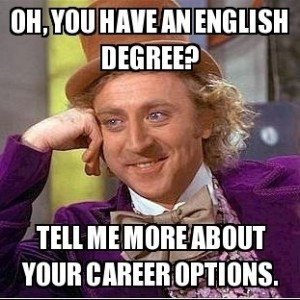
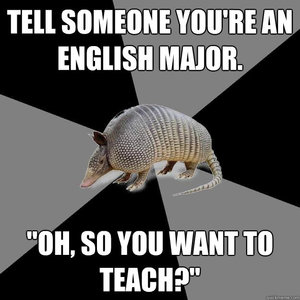

The memes are wrong. Take a moment to look over the rather different graphics below. These are taken from the 2015 report of the National Association of Colleges and Employers, an organization that annually surveys businesses that recruit on college campuses.
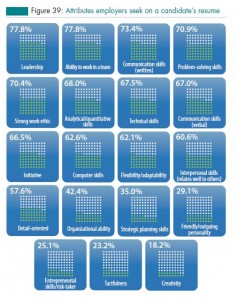
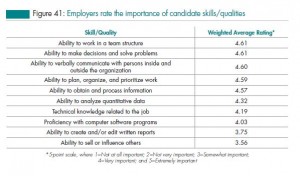
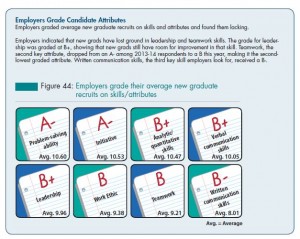
A few things to note here:
- Technical and quantitative skills are on the list, but employers are actively seeking a much wider range of NON-technical and NON-quantitative skills.
- Written communication skills are in high demand but rare among the new graduate recruits that companies hire.
- Problem-solving, leadership, teamwork, and organization are also skills that employers value.
What does this mean for you as an English major? Look at the top 5 skills listed on “Figure 41” (the middle one up there). We asked U of I English and Creative Writing faculty to talk about how and English or Creative Writing major advances these skills. Click on the links to see their answers:
- “Ability to work in a team structure”
- “Ability to make decisions and solve problems”
- “Ability to verbally communicate…”
- “Ability to plan, organize, and prioritize work”
- “Ability to obtain and process information”
Your internship experience gives you the opportunity to apply these skills directly to non-academic situations, as do part-time jobs, RSO involvement, summer employment, volunteer jobs, and the like.
For attendance credit this week, you need to do two things:
First, respond to this post by answering these questions in a single, thoughtful reply:
(a) Among these top five skills sought by employers, which two do you think are your particular strengths? How do you know?
(b) Among these top five skills sought by employers, which two does your internship give you the most opportunity to work on?
Second, let’s acknowledge a particularly annoying feature of these top five skills: they are SO VAGUE as to be almost meaningless, but still meaningful enough that it’s hard to dismiss them out of hand. After all–if employers take them seriously as criteria for evaluating job candidates, we need to take them seriously, too.
(“Teamwork” for example is obviously important. We’ve all probably been in groups where people didn’t pull their weight. It’s annoying. But “teamwork” can mean a lot of different things. Teamwork in a rigidly hierarchical hospital operating room is very different from collaborative teamwork on, say, a grassroots political campaign. Some teams require people to arrive at consensus, other teams require people to cope well when their good ideas get shot down.)
SO, you’ll need to reply to at least one classmate’s post in order to get full attendance credit, but instead of saying something bland and pro-forma like “Great post! Sounds like you’re getting good experience!” try to use a classmate’s experience as a springboard for exploring what one of these five skills means for you and how your own personal strengths connect to it. Reply with a sentence or two about how your experience differs and reveals a different component of the particular skill, or about how you realize that you would thrive/not thrive in the internship described because your strengths for that skill tend in a different direction or…whatever comes to mind as a way to learn from your classmates’ experience about what these skills mean for you.
Welcome to the Coffeehouse!
As the tagline says, for those who have a time conflict with the face-to-face English 199-INT class, this microsite will take the place of face-to-face meetings. I’ll make posts–you guys will discuss them in comments. To take the place of attendance credit in the face-to-face version of the class, you will need to respond to the prompts I offer in a weekly post and comment on at least one of your classmate’s remarks. Posts will appear by the time the class meets on Monday at 4pm and you will have until the following Monday to post your reply and your comments on a classmate’s reply.
If you’d prefer to use a nickname on this site, rather than the default, which is your illinois.edu email address, you can choose how you appear by clicking on your name in the upper right hand corner to get “Edit My Profile” on the pull-down menu.
There are also weekly assignments to complete: more information about those will be in the syllabus and the Compass site (both of which I’m still fine-tuning). They will be ready by the time the face-to-face class meets tomorrow (Monday, 3/14, at 4pm).
This week’s “attendance” post will appear tomorrow (along with the syllabus). Just to make sure everyone has found their way to this site, though, and that it’s working as it should, could you please “comment” on this post with a brief introduction? We’ll be learning a lot in these next eight weeks about professional presentation and self-promotion, so for this initial post, let’s NOT do that. Tell us your name and ONE fact about yourself (PG-13, please) that is NOT likely to come up in a job interview. You don’t need to write more than a sentence or so–like I said, this is just to make sure all the bugs are worked out of this site.
Stay tuned for more information tomorrow! I look forward to getting to know you all better!